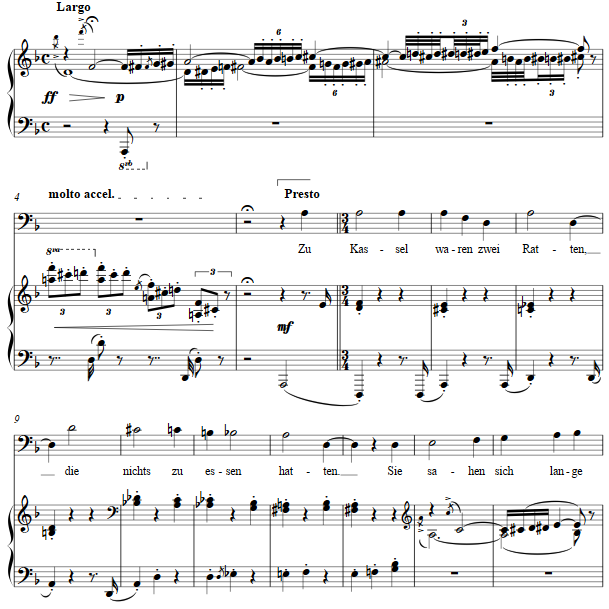Music and Texts of GARY BACHLUND
Vocal Music | Piano | Organ | Chamber Music | Orchestral | Articles and Commentary | Poems and Stories | Miscellany | FAQs
Aus der Zopfzeit - (2018)
Heinrich Heine
for baritone and piano
Zu Kassel waren zwei Ratten,
Die nichts zu essen hatten.
Sie sahen sich lange hungrig an;
Die eine Ratte zu wispern begann:
»Ich weiß einen Topf mit Hirsebrei,
Doch leider steht eine Schildwach dabei;
Sie trägt kurfürstliche Uniform,
Und hat einen Zopf, der ist enorm;
Die Flinte ist geladen mit Schrot,
Und wer sich naht, den schießt sie tot!«
Die andere Ratte knistert
Mit ihren Zähnchen und wispert:
»Des Kurfürsten Durchlaucht sind gescheit
Er liebt die gute alte Zeit,
Die Zeit der alten Chatten,
Die lange Zöpfe hatten.
Durch ihre Zöpfe die Chatten
Wetteiferten mit den Ratten.
Der Zopf ist aber das Sinnbild nur
Des Schwanzes, den uns verlieh die Natur;
Wir auserwählten Geschöpfe,
Wir haben natürliche Zöpfe.
O Kurfürst, liebst du die Chatten,
So liebst du auch die Ratten;
Gewiß für uns dein Herze klopft,
Da wir schon von der Natur bezopft.
O gib, du edler Philozopf,
O gib uns frei den Hirsetopf,
O gib uns frei den Topf mit Brei,
Und löse ab die Schildwach dabei!
Für solche Huld, für solchen Brei,
Wir wollen dir dienen mit Lieb und Treu.
Und stirbst du einst, auf deinem Grab
Wir schneiden uns traurig die Schwänze ab,
Und flechten sie um dein Haupt als Kranz;
Dein Lorbeer sei ein Rattenschwanz!«7 pages, circa 4' 30"
In an anthology of Heine's texts which I was carrying with me, I had the chance to notate a few germs in some free time at the theater. Notions can come to mind and be forgotten as well, so quickly jotting ideas down can flesh out an interesting musical idea for later working. Far more time consuming is that necessary to pen a rhymed paraphrase to Heine's clever words, as below:
Of a Pig-Braided Time - a fable
In Kassel did two rats meet;
Both had quite nothing to eat.
Staying hungry was not a plan;
One then whispered as he began:
»I know of a pot of sorghum stew,
But a sentry cat keeps it in view;
Uniformed in the stately manner,
She sports braids like a banner.
Her flintlock is loaded with steel shot,
And a thief would be killed on the spot.«
At that, the other softly stirred
And through sharpened teeth he purred:
»His most excellent Excellency is wise,
And loves traditions to canonize,
In the time of the feline, furred of old,
Hair was worn braided, so it's told.
Such excessively braided cats
Would then contest with the rats.
The pig-tailed braid is a symbol,
For Nature's gift, a tail nimble.
We are among Mother Nature's best,
For naturally we are with tails blessed.
O Elector, as you love your kitties,
So love the ratties of your cities;
Surely your heart can hold us dear,
Braided is how we could appear.
O grant, philosopher most able,
Some stew to eat at your table.
O favor us with that sorghum stew
By sending the sentry out-of-view!
For such favor, for such flavor,
Our love and loyalty shall not waiver.
At your death, and upon your grave,
We'll clip our tails with closest shave,
And weave them as a crown and wreath,
Braided rat tails above as lie beneath!«
Copyright © 2018 Gary Bachlund All international rights reserved.
The so-called Zopfzeit refers to pigtail style in German architecture, a style in the transition between Rococo and Classicism in the late 1700s. The eruption of a more egalitarian trend with the Enlightenment brought many architectural and artistic styles to their conclusions. Heine mixes this sense of what was deemed in his time to be old-fashioned with word play, and the use of the term, Chatten, sits between French and German as a construction which echoes that time of the mid-1800s, a time of revolutions and the migrant behavior of artists, writers and philosophers between what became Germany and France, though the borders were different than in the present day. One of Busoni's bagatelles in the Opus 28 carries this title.
Two voices creep into view, skittering chromatically and dryly. Narration begins with the text, setting the stage as the two rats take their places to enact their parts in this little fable. The text is found in Heine's Nachgelesene Gedichte (1845 1856).
The score is available as a free PDF download, though any major commercial performance or recording of the work is prohibited without prior arrangement with the composer. Click on the graphic below for this art song score.

